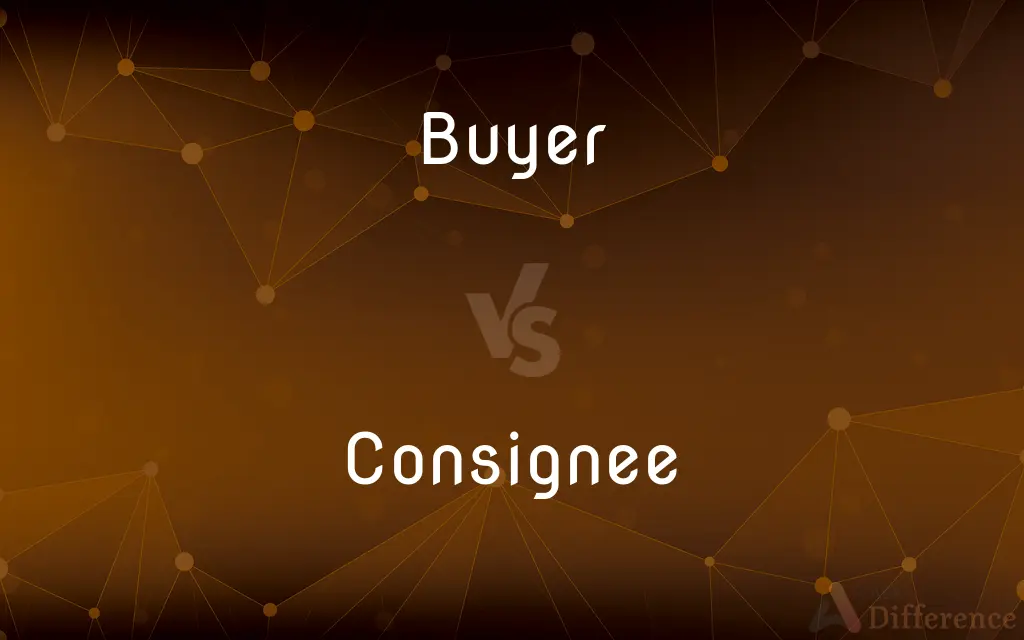Buyer vs. Consignee — What's the Difference?
By Fiza Rafique & Urooj Arif — Updated on March 20, 2024
A buyer purchases goods or services, typically assuming ownership, while a consignee receives goods for sale, storage, or transfer without taking ownership.

Difference Between Buyer and Consignee
Table of Contents
ADVERTISEMENT
Key Differences
A buyer is an individual or entity that purchases goods or services, entering into a transaction with the intent of acquiring ownership. The buyer is responsible for paying the seller and, upon completion of the transaction, assumes ownership of the goods or benefits from the services provided. In contrast, a consignee is an individual or entity named in a shipping contract to whom goods are to be delivered. The consignee might be the end customer, a middleman, or an agent, but importantly, they do not take ownership of the goods upon receipt. Instead, the goods remain the property of the consignor until sold.
The role of a buyer is straightforward in most transactions, involving the selection of goods or services, agreement on terms, payment, and then taking possession. The consignee, on the other hand, has a more specific role, often within a consignment arrangement, where goods are sent by the consignor to the consignee. The consignee is responsible for the sale or care of the goods without owning them. They may earn a commission upon sale but do not bear the initial cost of the goods.
In the buyer's case, the relationship is primarily with the seller, and the transaction concludes with the exchange of goods for payment. For the consignee, the relationship can be more complex, involving duties such as storing, displaying, and selling the goods on behalf of the consignor. The consignee must manage these goods separately from their own, if applicable, and ensure they are accounted for correctly.
The financial risks for buyers and consignees also differ. Buyers risk their capital upfront in purchasing goods or services with the expectation of utility or resale value. Consignees, however, generally do not risk their capital on the inventory received; their risk is more aligned with the responsibility of care and the potential cost associated with unsold inventory or any agreed-upon terms with the consignor.
Both buyers and consignees are essential in the commerce ecosystem, playing different roles in the movement and sale of goods. While buyers fuel the market through demand and purchasing power, consignees facilitate the distribution and accessibility of products, often providing a platform for consignors to reach potential buyers.
ADVERTISEMENT
Comparison Chart
Role
Purchases goods or services
Receives goods for sale, storage, or transfer
Ownership
Assumes ownership upon purchase
Does not take ownership upon receipt
Financial Risk
Risks capital in purchasing goods
Risks related to the care and potential unsold inventory
Relationship
Direct with the seller
With consignor for managing and selling goods
Responsibility
Payment and acquisition
Sale, storage, or transfer without owning the goods
Compare with Definitions
Buyer
Engages in purchasing transactions.
The buyer negotiated a favorable price for the bulk purchase of electronics.
Consignee
Receives goods on consignment.
The consignee received the latest fashion collection to display in their boutique.
Buyer
Bears financial risk.
The buyer invested heavily in the new software, hoping it would enhance operational efficiency.
Consignee
Does not take ownership upon receipt.
Despite housing the goods, the consignee did not own the electronics stored in their warehouse.
Buyer
Assumes ownership of goods.
Upon completing the transaction, the buyer became the owner of the vehicle.
Consignee
Responsible for the care or sale of goods.
The consignee diligently managed the inventory, ensuring items were sold within the season.
Buyer
Focused on utility or resale value.
The art buyer was interested in pieces with potential for appreciation in value.
Consignee
Earns commission upon sale.
For every piece sold, the consignee earned a percentage as agreed with the consignor.
Buyer
Direct relationship with seller.
The buyer and seller agreed on the terms of sale after several discussions.
Consignee
Manages goods separately if necessary.
The consignee kept the consigned artworks separate from the gallery's owned collection to prevent confusion.
Buyer
One that buys, especially a purchasing agent for a retail store.
Consignee
In a contract of carriage, the consignee is the entity who is financially responsible (the buyer) for the receipt of a shipment. Generally, but not always, the consignee is the same as the receiver.
Buyer
A person who makes one or more purchases.
Every person who steps through the door is a potential buyer, so acknowledge their presence.
Consignee
The one to whom something, such as goods or merchandise, is consigned.
Buyer
(retailing) A person who purchases items for resale in a retail establishment.
The supermarket's new buyer decided to stock a larger range of vegetarian foods.
Consignee
The person to whom a shipment is to be delivered.
Buyer
(manufacturing) A person who purchases items consumed or used as components in the manufacture of products.
Consignee
One to whom anything is consigned or entrusted.
Buyer
One who buys; a purchaser.
Consignee
The person to whom goods or other things are consigned; a factor; - correlative to consignor.
Consigner and consignee are used by merchants to express generally the shipper of merchandise, and the person to whom it is addressed, by bill of lading or otherwise.
Buyer
A person who buys
Consignee
The person to whom merchandise is delivered over
Common Curiosities
What is the financial risk for a buyer?
The financial risk for a buyer includes the initial capital outlay and the potential that the purchased goods or services may not provide the expected value or return.
What distinguishes a buyer from a consignee?
A buyer acquires ownership of goods through purchase, whereas a consignee receives goods to manage or sell without becoming the owner.
Is the relationship between a consignee and a consignor always commercial?
While often commercial, the relationship can also be personal or informal, depending on the context and the agreement between the consignee and consignor.
Can a consignee eventually become a buyer?
Yes, a consignee can become a buyer if they decide to purchase the consigned goods, transitioning from managing to owning them.
How does a consignee earn money?
A consignee typically earns money through commissions on the sale of consigned goods or through agreed-upon fees for storage and management.
What happens to unsold consigned goods?
Unsold consigned goods are usually returned to the consignor, unless otherwise agreed upon, such as purchasing them at a reduced price or disposing of them.
Do consignees need special insurance for consigned goods?
Yes, consignees often need separate insurance for consigned goods to cover potential loss or damage while in their care.
Who bears the cost of transporting goods to a consignee?
The cost of transportation is typically negotiated between the consignor and consignee and can vary based on the terms of their agreement.
What legal responsibilities does a consignee have?
A consignee's legal responsibilities include care, reasonable storage, and diligent effort in selling the consigned goods, adhering to the consignment agreement terms.
Can a consignee refuse to accept consigned goods?
Yes, a consignee can refuse to accept consigned goods if they do not meet the agreed-upon conditions or if the consignment no longer fits their business strategy.
Share Your Discovery

Previous Comparison
Pugilist vs. Boxer
Next Comparison
Oratory vs. ChurchAuthor Spotlight
Written by
Fiza RafiqueFiza Rafique is a skilled content writer at AskDifference.com, where she meticulously refines and enhances written pieces. Drawing from her vast editorial expertise, Fiza ensures clarity, accuracy, and precision in every article. Passionate about language, she continually seeks to elevate the quality of content for readers worldwide.
Co-written by
Urooj ArifUrooj is a skilled content writer at Ask Difference, known for her exceptional ability to simplify complex topics into engaging and informative content. With a passion for research and a flair for clear, concise writing, she consistently delivers articles that resonate with our diverse audience.
















































